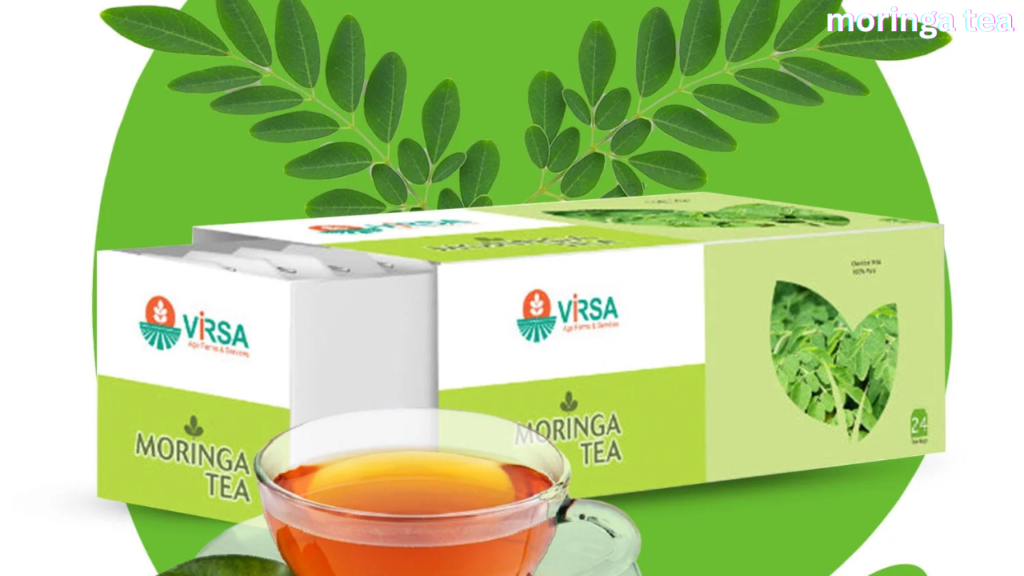Moringa Tea The Superfood Brew for Health and Wellness

Moringa tea, made from the leaves of the Moringa tea oleifera tree, has been gaining worldwide popularity as a superfood due to its exceptional health benefits. Known for its rich nutritional profile, Moringa tea is becoming a go-to beverage for individuals looking to improve their overall wellness. But beyond its pleasant earthy taste, Moringa tea boasts a wide range of health benefits, from supporting the immune system to aiding digestion and managing blood sugar levels. In this article, we will dive deep into the wonders of Moringa tea, how to prepare it, potential side effects, and more!
What is Moringa Tea?
Moringa tea is made from the leaves of the Moringa tree, scientifically known as Moringa tea oleifera. Native to India, this tree has been used for thousands of years in traditional medicine due to its numerous health-promoting properties. The leaves are dried and processed into tea bags or loose-leaf tea, which can then be steeped in hot water to create a nourishing beverage.
The nutritional profile of Moringa tea is remarkable. It’s packed with vitamins such as A, C, and E, which are known for their antioxidant properties. Moringa tea also contains vital minerals like calcium, iron, and potassium, making it an excellent choice for supporting bone health and boosting energy levels. Additionally, it is rich in amino acids and antioxidants, which help to fight free radicals in the body, promoting overall health and wellness.
Compared to other herbal teas, Moringa tea stands out due to its superior nutrient density. While many herbal teas offer a refreshing taste, Moringa tea also provides significant health benefits, offering more than just hydration. It is often regarded as a natural superfood because of its potential to support various body functions.
Health Benefits of Moringa Tea
Rich in Antioxidants
One of the most significant benefits of Moringa tea is its high antioxidant content. Antioxidants are compounds that help neutralize harmful free radicals in the body, which are unstable molecules that can damage cells and contribute to chronic diseases like heart disease and cancer. Moringa tea contains antioxidants such as quercetin, chlorogenic acid, and beta-carotene, which help protect the body from oxidative stress.
These antioxidants are known to support overall health by reducing inflammation and promoting better cellular function. By drinking Moringa tea regularly, you can boost your body’s ability to fight oxidative damage, which is a crucial factor in maintaining long-term health. The presence of chlorogenic acid, a compound also found in coffee, further adds to the tea’s ability to regulate blood sugar levels and support heart health.
Supports the Immune System
Moringa tea is also known for its immune-boosting properties. Packed with Vitamin C, this tea helps strengthen the body’s natural defense systems and protect against infections. Vitamin C plays a crucial role in the production of white blood cells, which are essential for fighting off viruses and bacteria. Additionally, the antibacterial and antiviral properties of Moringa tea can help reduce the likelihood of illness, making it a great beverage for maintaining immunity year-round.
Beyond Vitamin C, Moringa tea contains other beneficial nutrients like Vitamin A and zinc, which further enhance immune function. These vitamins and minerals work synergistically to boost your body’s ability to defend against pathogens. Whether you’re looking to prevent a cold or reduce inflammation, Moringa tea is a powerful, natural way to strengthen your immune system.
Aids in Digestion and Gut Health
Moringa tea also supports digestive health. The antioxidants and anti-inflammatory properties of Moringa tea make it an excellent choice for individuals dealing with digestive issues like bloating, constipation, and indigestion. The tea has mild laxative effects that can help improve bowel movement and prevent constipation by promoting smoother digestion.
Moreover, Moringa tea helps balance the gut microbiome. The healthy bacteria in your gut are essential for optimal digestion and nutrient absorption. By supporting these beneficial microbes, Moringa tea helps enhance your digestive process, reducing discomfort and promoting a healthy digestive tract. Regular consumption of Moringa tea can also reduce stomach bloating and ease discomfort after meals.
Supports Weight Management
Moringa tea may also be beneficial for those looking to manage their weight. It is known to boost metabolism, which can help the body burn calories more efficiently. By promoting fat burning and controlling appetite, Moringa tea can be a helpful addition to a weight loss plan. The tea’s ability to balance blood sugar levels also prevents sudden hunger spikes, reducing the likelihood of overeating.
Additionally, the high fiber content in Moringa tea contributes to feelings of fullness, making it an ideal beverage to include in a diet aimed at weight management. Drinking Moringa tea regularly can support healthy weight loss while offering essential nutrients that the body needs for optimal function.
How to Make Moringa Tea at Home

Ingredients Needed
Making Moringa tea at home is simple and requires minimal ingredients. You can choose between dried Moringa tea leaves or pre-made Moringa tea bags, depending on your preference. If using dried Moringa leaves, you can either crush them into smaller pieces or use them as whole leaves. Optional ingredients such as honey, lemon, ginger, or cinnamon can be added to enhance flavor and increase health benefits.
Step-by-Step Preparation
To prepare Moringa tea, start by boiling water in a kettle or pot. Once the water reaches a rolling boil, place 1 to 2 teaspoons of dried Moringa tea leaves or one tea bag into your cup. Pour the hot water over the leaves or tea bag, and let it steep for about 5-10 minutes. If you like stronger tea, you can let it steep for a few extra minutes.
Once brewed, remove the tea bag or strain the leaves, and if desired, add honey, lemon, or a pinch of cinnamon for extra flavor. Moringa tea can also be enjoyed cold by brewing the tea and letting it chill in the refrigerator.
Best Time to Drink Moringa Tea
The best time to enjoy Moringa tea largely depends on your health goals. For boosting energy and metabolism, drinking it in the morning or before a workout is ideal. To aid digestion, drinking Moringa tea before or after meals can be beneficial. If you’re looking to relax and improve sleep quality, a cup of Moringa tea before bed may promote calmness due to its mild stress-relieving properties.
Potential Side Effects and Precautions
Although Moringa tea is generally safe for most people, there are some potential side effects to be aware of. Some individuals may experience mild digestive issues, such as nausea, diarrhea, or stomach discomfort when they first start drinking Moringa tea. If this occurs, it’s recommended to reduce the amount or frequency of consumption.
Who Should Avoid Moringa Tea?
Moringa tea should be avoided by pregnant and breastfeeding women due to its potential effects on uterine contractions. Additionally, individuals on medications for blood pressure, diabetes, or thyroid conditions should consult a healthcare professional before incorporating Moringa tea into their routine, as it may interact with certain medications.
Recommended Dosage
As with any supplement or herbal remedy, moderation is key. It is generally safe to drink 1 to 2 cups of Moringa tea per day. However, it is always best to consult with a healthcare provider, especially if you have pre-existing conditions or are on medication.
Conclusion
‘Moringa tea is undoubtedly a powerful and nutrient-packed beverage that offers a wide array of health benefits. From boosting your immune system to supporting weight management and improving digestion, Moringa tea has earned its place in the world of superfoods. When consumed in moderation, it can be a valuable addition to your daily routine, offering both health and wellness benefits in every cup. Remember to consult with a healthcare provider if you have any concerns about incorporating Moringa tea into your lifestyle. Enjoy the many benefits that this remarkable tea has to offer and take the first step toward a healthier you!
FAQs
Q1: Can I drink Moringa tea every day?
A: Yes, drinking Moringa tea every day is safe for most people, but it’s important to consume it in moderation—1 to 2 cups daily.
Q2: Does Moringa tea have caffeine?
A: No, Moringa tea is naturally caffeine-free, making it a perfect choice for those looking to avoid caffeine.
Q3: How long does it take to see the benefits of drinking Moringa tea?
A: Some benefits, like improved digestion, may be felt immediately, but others, like better blood sugar regulation, could take a few weeks.
Q4: Can Moringa tea help with skin and hair health?
A: Yes! Moringa tea’s high vitamin and antioxidant content can help improve skin hydration and promote healthy hair growth.
Q5: What does Moringa tea taste like?
A: Moringa tea has a mild, earthy, and slightly grassy flavor, similar to green tea but with a unique twist.
You May Also Read: https://techvbusiness.com/cephalexin-for-dogs/




